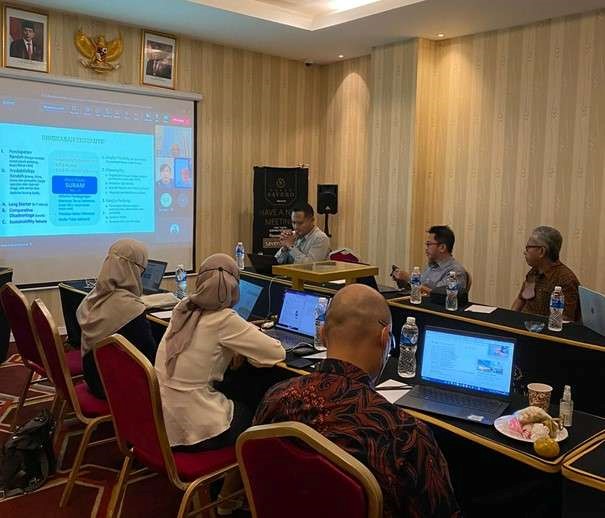
Continuing from initial discussions that addressed the study of forest bioeconomy in Indonesia, Bappenas recently held a series of FGDs aimed at securing views and input from stakeholders regarding bioeconomy potential. One of these discussions was held with industry players and specifically addressed the processing of forest products. FORCLIME facilitated this discussion with industry experts, which was held on 1 November 2022 in Bogor as well as online.
The meeting was opened by Dr. Nur Hygiawati Rahayu, ST, MSc, the Director of Forestry and Water Resources Conservation for Bappenas before continuing with a presentation given by a number of experts from the Bandung Institute of Technology, who introduced the underlying objectives and scope of the study. Speakers at this meeting included representatives from Perum Perhutani (a state-owned timber company), the Association of Indonesian Rubber Companies and PT Riau Andalan Pulp & Paper.
Several important points were made by the speakers in relation to the performance of the processing industry and the various commodities that it manages, including pine resin, eucalyptus, rubber and derivative products that are or that will be developed. Several key challenges were also addressed by the speakers, including a lack of competition between their products and imported raw materials, as well as the fact that their exports are less competitive than products from other countries. In terms of rubber specifically, 90% of rubber plantations remain dominated by smallholder plantations and, as a result of urgent need, farmers often do not want to endure the long wait required in terms of the planting of rubber plantations. This in turn leads to less productive plantations, a problem that is exacerbated by the low price of natural rubber which causes farmers to lean towards the development of other commodities. As a result, support from the government will be required to maintain the continuity of production from farmers.
One important message that emerged during the discussion and that will ultimately be followed up on is the importance of developing derivative products to boost the performance of the forest product industry and support bioeconomic development. In addition, it is necessary to identify the root cause of each commodity from upstream to downstream and viable solution strategies, as well as generate an analysis of the most profitable commodity through optimal processing from an economic standpoint. Product clustering is also vital in terms of determinations of potential product developments across each region of Indonesia, both on a small and large scale.
For more information, please contact:
Nurdita Rahmadani, Junior Advisor for Monitoring, Evaluation and Reporting
Pipin Permadi, Senior Advisor and Liaison Officer
Wandojo Siswanto, Strategic Area Manager for Forest Policy and Climate Change






